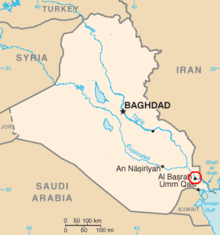U.S. launches airstrikes against Basra militants
Saturday, March 29, 2008

United States warplanes dropped two bombs on a suspected militant stronghold in Basra Saturday, as the Iraqi offensive aimed at driving out Shiite militants from the city reached its fifth day.
An Iraqi policeman says that the U.S. airstrike on a house in Basra's Hananiyah neighborhood killed 8 civilians. The U.S. military has not yet commented on the policeman's report, but British military spokesman Maj. Tom Holloway says the report is under investigation.
"We are aware of reports of incidents in the Basra area resulting in civilian casualties," Holloway said. "We are investigating the reports and do not have any further details at this time." British troops joined the fighting in Basra on Saturday, firing artillery and providing air support.
Meanwhile, Shiite cleric and Mahdi Army leader Muqtada al-Sadr called on his followers to defy the Iraqi government, which has ordered the militants to surrender their weapons. An initial 72-hour ultimatum was widely ignored, and the government has now given the militia until April 8 to give up their arms.
Salah al-Obaidi, a top aide to al-Sadr, said, "Muqtada al-Sadr has told us not to surrender our arms except to a state that can throw out the occupation," referring to the U.S. occupation of Iraq.
In a speech today, Iraqi Prime Minister Nouri al-Maliki did not mention al-Sadr's movement, and he said the purpose of the crackdown in Basra "was only to deal with these gangs", some of whom, he says, are "worse than al-Qaeda". Other Iraqi officials have also insisted that the Mahdi Army was not the target of the offensive.
"Our determination is strong," al-Maliki said. "We will not leave Basra until security is restored, those who break the law are punished and those who draw their weapons in the face of the state are punished."
Still, the crackdown has sparked a violent reaction from al-Sadr's supporters, as well as Shiites in other areas of Iraq. In Baghdad's Sadr City neighborhood, a Shiite stronghold, Iraqi officials said that 75 people had been killed and nearly 500 were wounded in fighting between insurgents and security forces. Two Americans were killed by a roadside bomb in east Baghdad Saturday.
Some of the policemen in Sadr City are influenced by al-Sadr and are sympathetic to his movement. Around 40 Sadr City policemen handed over their weapons and ammunition to the Mahdi Army's local office, wearing masks to shield their identities. "We can't fight our brothers in the Mahdi Army, so we came here to submit our weapons," one policeman said.
U.S. helicopters launched airstrikes in Sadr City on Friday night, which they say killed 10 militants. This move was criticized by Nassar al-Rubaie, a Shiite member of Parliament. "We condemn the government asking occupation forces to carry out airstrikes against our people," he said. "We say Iraq sovereignty will not be achieved through military operation against Iraqis, as Bush claimed, but it can be achieved through throwing the occupation forces out of Iraq."
Related news
- "Iraqi forces battle militants in Basra for second day" — Wikinews, March 27, 2008
Sources
- Ryan Lenz, Associated Press. "Police: US airstrike kills 8 in Basra" — Wire Dispatch, March 29, 2008
- "U.S. bombs Basra to support Iraqi forces" — CNN, March 29, 2008
- Robert H. Reid, Associated Press. "Shiite leader al-Sadr defies Iraq gov't" — Houston Chronicle, March 29, 2008
- "Sadr orders his men not to surrender their arms" — Al-Bawaba, March 29, 2008

